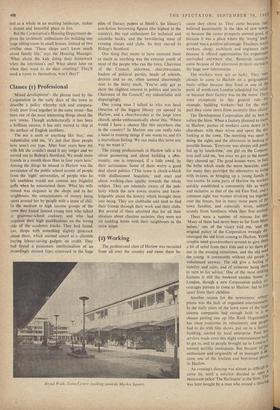Classes (I) Professional
'Mixed development'—the phrase used by the Corporation in the early days of the town to describe a policy whereby rich and compara- tively poor lived together in the same street—has been one of the most interesting things about the new towns. Though architecturally it has been a brilliant success, it has only started to chip at the surface of English snobbery.
'I'm not a snob or anything like that,' one industrialist told me, 'it's just that these people here aren't our type. After four years here my wife felt she couldn't stand it any longer and we moved out to Bishop's Stortford. We made more friends in a month there than in four years here.' Among the things he missed in Harlow was the prevalence of the public school accent, of people from the 'right' universities, of people who he felt confident would not commit any frightful gaffe when he entertained them. What his wife missed was elegance in the shops and in her neighbours, the consciousness of money being spent around her by people with a sense of chic. In the medium to high income groups of the town they found instead young men who talked in grammar-school cockney, and who had acquired thcir high qualifications on the wrong side of the academic tracks. They had found, too, shops with something slightly gimcrack about them, which seemed aimed at a clientele buying labour-saving gadgets on credit. They had found a passionate intellectualism of an exceedingly earnest type; expressed in the huge piles of literary papers at Smith's, the library's non-fiction borrowing figures (the highest in the country), the vast enthusiasm for technical and scientific books, and the bewildering mass of evening classes and clubs. So they moved to Bishop's Stortford.
One thing that seems to have annoyed them as much as anything was the extreme youth of most of the people who ran the town. Chairman of the Council, aldermen, churchwardens, leaders of political parties, heads of schools, doctors and so on, often seemed disarmingly near to the thirty mark. 'You've only got to show the slightest interest in politics and you're Chairman of the Council,' my industrialist said disparagingly.
One young man I talked to who was head librarian of the biggest library yet opened in Harlow, and a churchwarden at the large town church, spoke enthusiastically about this. 'Where would I have a chance like this anywhere else in the country? In Harlow one can really take a hand in running things if one wants to, and it's a marvellous feeling. We can make this town any way we want it.'
The young professionals in Harlow talk a lot about pioneering and about building a darn- munity; one is impressed, if a little awed, by their seriousness. Some of them worry a good deal about politics (This town is chock-a-block with disillusioned Socialists,' said one) and about working-class apathy towards the whole subject. They are intensely aware of the pub- licity which the new towns receive and know- ledgeable about the history which brought them into being. They are clubbable and tend to find their friends through their work and their clubs. But several of them admitted that for all their idealism about classless societies, they were not on nodding terms with their neighbours in the same street.










































 Previous page
Previous page